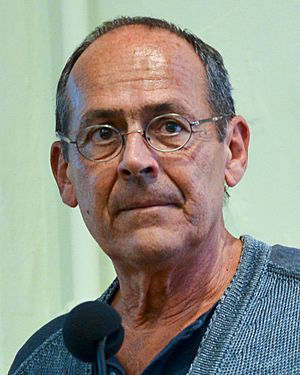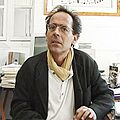Bernard Stiegler facts for kids
Quick facts for kids
Bernard Stiegler
|
|
|---|---|

Bernard Stiegler in 2016
|
|
| Born | 1 April 1952 Seine-et-Oise, France
|
| Died | 5 August 2020 (aged 68) Épineuil-le-Fleuriel, France
|
| Education | Université de Toulouse-Le-Mirail École des Hautes Études en Sciences Sociales (PhD, 1993) |
| Era | 21st-century philosophy |
| Region | Western philosophy |
| School | Continental philosophy Deconstruction Post-structuralism |
| Institutions | Institut de recherche et d'innovation, Centre Georges-Pompidou |
|
Main interests
|
Philosophy of technology · Individuation |
|
Notable ideas
|
Symbolic misery (mass exclusion from cultural production constitutes a form of generalized impoverishment) |
|
Influenced
|
|
Bernard Stiegler (born April 1, 1952, in Seine-et-Oise, France – died August 5, 2020) was an important French philosopher. He was known for his ideas about technology and how it affects human life and society. Many people considered him one of the most influential European thinkers of the 21st century.
Stiegler led the Institut de recherche et d'innovation (IRI), which he started in 2006. This institute was part of the famous Centre Georges-Pompidou in Paris. He also founded a group called Ars Industrialis in 2005, which focused on political and cultural issues. In 2010, he opened his own philosophy school, pharmakon.fr, in Épineuil-le-Fleuriel, France. His most famous book is Technics and Time, 1: The Fault of Epimetheus.
Contents
Early Life and Learning
Bernard Stiegler became interested in philosophy while studying by correspondence at the University of Toulouse-Le-Mirail. He learned from Gérard Granel, a well-known philosopher. This period helped shape his future work and ideas.
His Work and Career
Stiegler had a busy career in philosophy and cultural development. In 1987–88, he helped organize an exhibition at the Centre Georges-Pompidou. It was about libraries and technology.
He earned his PhD in 1993 from the École des Hautes Études en Sciences Sociales. His mentor was the famous philosopher Jacques Derrida. Stiegler also taught at several universities, including the University of Technology at Compiègne. He was also a visiting professor at Goldsmiths, University of London.
Stiegler held important leadership roles. He was the Director General at the Institut National de l'Audiovisuel (INA). He also served as Director General at the Institut de Recherche et Coordination Acoustique/Musique (IRCAM).
Starting New Groups
In 2005, Stiegler started a group called Ars Industrialis. This group focused on how industry and culture could work together. They believed in using technology to improve society. In 2006, he became the Director of Cultural Development at the Centre Georges-Pompidou. He also started the Institut de recherche et d'innovation (IRI) there.
In 2010, Stiegler opened his own philosophy school, pharmakon.fr. It was in the small French town of Épineuil-le-Fleuriel. The school offered courses for high school students and a doctoral program. It also held a summer academy for students and local people. The school explored Stiegler's ideas about society moving beyond just buying things. It also looked at how technology affects our lives.
Family Life
Bernard Stiegler had a daughter named Barbara Stiegler, born in 1971. She is also a philosopher. She teaches at the Université Bordeaux-Montaigne. Barbara has written several books on philosophy.
Stiegler's Main Ideas
Stiegler's ideas were influenced by many other thinkers. These include Sigmund Freud, André Leroi-Gourhan, Gilbert Simondon, and Jacques Derrida.
His main topics included:
- Technology and its role in human life.
- How people become individuals (individuation).
- The impact of consumerism and digital technology.
- The future of society and politics.
Stiegler wrote many books and articles. Here are some of his important book series:
Technics and Time
This series explores how technology shapes human history and memory. Stiegler believed that technology is not just a tool. It is a fundamental part of what makes us human. He argued that technology helps us remember and create our sense of time. He also suggested that humans are "adoptive" and "prosthetic" creatures. This means we constantly use and adapt to tools and technologies.
Symbolic Misery
In this series, Stiegler looked at how modern technology affects our culture and desires. He worried that industrial ways of producing things could make people feel less unique. He introduced the idea of "general organology." This concept looks at how human bodies, tools, and social groups work together. He also explored how our desires and sense of beauty change over time.
Disbelief and Discredit
This series discussed how industrial production and consumerism have changed human life. Stiegler argued that people have lost their "know-how" (how to do things) and "know-how-to-live" (how to live well). He called this "generalized proletarianization." He believed that society needs to transform its industrial system. This is to prevent a loss of meaning and spirit. He also talked about the "Antigone complex." This describes how the loss of authority affects politics and young people.
Constituting Europe
In this series, Stiegler focused on Europe. He argued that Europe needs a new way of thinking about itself. This would help create a new identity for the continent. He believed this new identity should be part of a global process. The goal was to reinvent industrial civilization.
Films and Television
Stiegler appeared in several films and TV shows. He often shared his ideas about technology and society.
- The Ister (2004): A documentary about the philosopher Martin Heidegger. Stiegler played a key role in the film.
- An Organization of Dreams (2009): An experimental film inspired by Stiegler's work. He also appeared in it.
- Le temps de cerveau disponible (2010): A documentary about television. Stiegler was the main participant.
- Après la gauche (2011): A documentary about the challenges facing political groups on the Left. Stiegler was featured in it.
Awards
- Officer of the Order of Arts and Letters (2016): This is a special award from the French government for contributions to arts and literature.
See also
 In Spanish: Bernard Stiegler para niños
In Spanish: Bernard Stiegler para niños
- différance
- The European Dream
- Yuk Hui
- Gilbert Simondon
- individuation
- list of deconstructionists
Images for kids
 | Selma Burke |
 | Pauline Powell Burns |
 | Frederick J. Brown |
 | Robert Blackburn |


